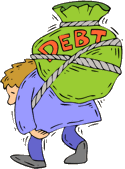The 10-20-70 Plan for Paying Off Debt
 I recently had a conversation with someone who was trying to pay off student loans and credit cards, while still trying to lead a normal life. His comment was “whenever I talk about going on a budget, everyone in my family gets upset and calls me a cheapskate”. Being a reformed cheapskate myself, I can relate to this.
I recently had a conversation with someone who was trying to pay off student loans and credit cards, while still trying to lead a normal life. His comment was “whenever I talk about going on a budget, everyone in my family gets upset and calls me a cheapskate”. Being a reformed cheapskate myself, I can relate to this.
So, without further delay, here is the plan:
The 10-20-70 Plan
- Save 10% of your Net Pay
- Pay 20% of your Net to Debt
- Spend 70% to Live Joyously
Why the 10-20-70 Plan Works
There are a number of reasons why this simple plan works so well. The most important reasons are that it is balanced and sustainable. There is no shortcut or magic to debt reduction. Any permanent solution requires lifestyle changes that keep you spending less than you earn. Having a sound repayment plan is a great start. But, then you need to remain debt-free forever. The best way to accomplish this is to have enough spending money to live comfortably.
It is well known and documented that people who discharge or refinance their debt have a greater than 80% chance of being back in debt within a short period of time. The banks call this “reloading” and they have it factored into their risk models. So, if you think you can shed or shuffle your debt, you will only be treating the symptom and not the cause of your problem. Instead, you need to break the spending habits that caused your debt in the first place.
Where the Plan Came From
This plan came from my favorite little book, The Richest Man in Babylon. In the book, a number of characters were in desperate trouble with debt and they were helped tremendously by this plan. My personal experience is that it definitely works, although I’m much better at saving than debt reduction.
I use a modified version of this plan that is 20-20-60. I’m very fortunate to be making good money right now and I am taking advantage of the low market prices to invest more. The living joyously part is my own addition. After a little practice, it’s quite easy for most people to live on 70% of their income. And, the best part of this plan is not having to squeeze pennies to reduce debt. You can and should have fun while you are working yourself out of debt.
Saving while you’re in Debt
The 10% savings is the most controversial part of this plan. Many people believe the debt should take precedence over savings because the debt usually has a higher interest rate. Although this may seem to make sense mathematically, it never makes sense to pay everyone but yourself. Being broke is always a bad financial plan. If you aren’t saving, you aren’t accumulating wealth.
That’s why Saving 10% is the number one item on the list. Pay Yourself First, before anyone else gets their money. Some people call it an emergency fund. I call it my wealth fund. Either way, it always makes sense to have some money put away. Savings and debt reduction are separate goals that must both be accomplished. So, don’t neglect one for the other.
Special Circumstances
Everyone’s financial circumstances are different. If you have little or no income, this plan isn’t going to help you. Your plan should be to generate more income. If you have extreme debt that cannot be reduced with 20% of your income, you may need to seek help from professionals. If you can’t live on 70% of your income, you may need to make some lifestyle changes. For example, you may need to sell a car or move to a cheaper housing.
The Bottom Line
The bottom line is that debt is very hard to pay off. But, it’s a pretty simple matter to take control of your debt. You just need a plan and a commitment to eliminating debt from your life. Otherwise, you may remain in debt forever.
“Debt is the slavery of the free.”
Publilius Syrus – Roman Author
Recommended Reading
This post was featured on the Carnival of Personal Finance. There are lots of great articles from many of the best personal fianance bloggers. Check it out.
Great post! I am using a system to where I can tithe 10%, save 10%, and then have the rest split into two separate accounts. One for my bills and the other for misc expenses.
That way I have a clear understanding of how much money I have to spend while the money to pay off debt, is already taken care of.
Hi Bret –
This is a great idea, one that people can really get to work! I sure hope our economy rights itself soon – so many people are out of work or looking forward to horrible taxes coming up.
Love,
Mom
Dear Bret, Thank you so much for posting this information. It has simplified an overwhelming problem for me. Wish me luck.
Great post! Just wanted to let you know you have a new subscriber- me!